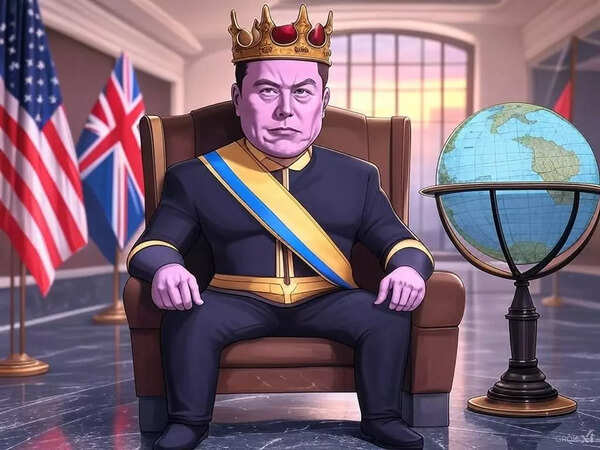Elon Musk isn’t just disrupting industries anymore—he’s playing the part of a self-appointed global power broker, the kind of figure who’d be more at home in a dystopian novel than in today’s international political arena. If Jeff Bezos is the corporate embodiment of the American dream, Musk is fast becoming the tech bro equivalent of an African warlord: unpredictable, unrelenting, and unabashedly self-righteous. Musk’s journey into political theatrics began at home, in the United States, where he has gleefully upended traditional power structures. His takeover of Twitter—sorry, X—wasn’t just a rebranding exercise; it was a declaration of war against the establishment. From shadowbanning critics to amplifying far-right rhetoric, Musk has turned his platform into a digital echo chamber for chaos. By threatening Republicans for not supporting his libertarian fantasies and whispering economic advice into Donald Trump’s ear, Musk has positioned himself as a kind of super president, untethered by any electoral mandate but wielding significant influence nonetheless.
Musk Targets World War Rivals—and the 1966 World Cup Winners
Musk has turned his attention to Europe, where he is simultaneously aiming his landmarks at Germany and the United Kingdom, the two nations who had a history of hostility toward British politics. It’s a political two-for-one that even Musk may orchestrate, seamlessly blending minor grievances with computational warfare.
Germany has now felt Musk’s outrage, with Tesla’s Western operations generally clashing with the government’s strict environmental laws. However, Musk’s plan has an uncomfortablely personalized tone in the UK. He accuses Labour Party leader Keir Starmer of failing to prosecute styling criminals while serving as Director of Public Prosecutions. Musk’s weapon of choice
Act I: Elon Musk’s Emergence as a Democratic Powerbroker in the US

Elon Musk’s transition from a tech mogul to a social influencer began in the United States, where his adjacent ties to incoming presidents JD Vance and Donald Trump have cementified his standing as an informal but very influent adviser.
Musk has evolved from transforming Twitter into a megaphone for his liberal and nationalist ideals to supporting hard-right immigration and national spending. His tweets frequently act as policy trial balloons, boosting far-right argumentations, and causing division within the Republican Party.
In one such instance, Musk recently argued with Trump supporters about immigration policy, calling for large arrests while also criticizing the effectiveness of the current protection apparatus. Some MAGA hardliners accuse Musk of overstepping his limitations, which sparked a conflict within the Trump station. Despite the resistance, Musk’s impact on the president’s priorities—especially regarding deregulation and governmental austerity—remains obvious.
Act II: Targeting the UK and Keir Starmer Over Rotherham

Musk had other countries in mind when he focused on the US. In the UK, he has inserted himself into one of the region’s most socially sensitive matters: the management of pampering groups, especially in Rotherham. Musk has targeted Labour leader Keir Starmer using his system, accusing him of failing to prosecute crime against offenders while serving as Director of Public Prosecutions.
Starmer has dismissed Musk’s problems as “misinformed”, while others have criticised Musk for using X’s algorithms to intensify far-right stories about the incident. Musk’s position with UK right-wing characters, including Reform UK and specific Tory MPs, has simply added to the belief that he is deliberately sowing division.
Muss has exacerbated the conflict between culture, violence, and justice by using one of the most well-known instances of institutional failure in the UK, the Rotherham scandal. He is accused of ignoring the thorough investigations and already-introduced structural changes while focusing on incendiary rhetoric that favors political parties opposed to Labour by critics.
Act III: Backing the Far-Right AfD in Germany

Maybe Musk’s most audacious move was his foray into European politics. His public support of the far-right Alternative for Germany ( AfD ) has changed political discourse in a nation that is notoriously resistant to extremist ideologies.
In a visitor opinion piece for Welt am Sonntag, Musk denied the AfD’s radical nature, citing party chief Alice Weidel’s same-sex relationship with a Sri Lankan girl as proof. Does that make you think Hitler sounds like that? Please”! Mussk wrote, rejecting Germany’s domestic intelligence classification of the AfD as a alleged extremism case.
The article provoked an immediate backlash. Eva Marie Kogel, the paper’s opinion editor, resigned in protest, citing the publication as a violation of journalistic integrity. Meanwhile, Welt’s leadership defended the decision to publish Musk’s piece, framing it as a commitment to free speech and public debate.
Underneath Musk’s essay, the newspaper’s editor-in-chief designate, Jan Philipp Burgard, published a counterargument, describing Musk’s endorsement of the AfD as “fatally false”. Burgard highlighted the AfD’s Eurosceptic, pro-Russia, and anti-China positions as contrary to Germany’s national interests.
Musk’s Claim to Global Influence
Musk’s justification for these interventions is as bold as his deeds. He claims that his” significant investments” in Germany, the US, and the UK give him a vested interest in their political stability and direction. In Germany, he pointed to Tesla’s Gigafactory Berlin as evidence of his stake in the country’s future, while in the UK, he framed his criticisms of Starmer as part of a broader commitment to justice reform.
Many people believe that Musk’s interventions represent a dangerous consolidation of power, but this global responsibility narrative has allowed him to frame his actions as benevolent rather than disruptive. Musk has an unheard-of feedback loop in which his influence directly affects political agendas and public discourse by using X’s algorithm to expand his viewpoints.
A Global Pattern of Disruption
Musk’s moves in the US, UK, and Germany reveal a consistent pattern: using populist rhetoric to exploit existing fractures in society. In each instance, he aligns himself with far-right organizations or figures, using his interventions to defend free speech and democratic values.
- He has challenged the Republican establishment and libertarian factions in the US.
- In the UK, he has weaponised one of the country’s most divisive issues to undermine Labour’s leadership.
- In Germany, he has lent credibility to a party that many view as a threat to the post-war democratic consensus.
The Risks of Musk’s Global Power Play
Elon Musk’s rise as a global disruptor has sparked comparisons to a modern-day Übermensch, wielding technology, wealth, and influence in ways that can reshape—or destabilise—the world. Like Superman, Musk is a figure of immense power, but unlike the comic book hero, his motives remain opaque, his allegiances fluid, and his accountability non-existent. What happens if this self-styled saviour decides the world doesn’t align with his vision? As Musk’s interventions grow bolder, so does the unease: not because he can destroy nations with a flick of his wrist, but because he might already be doing so—algorithm by algorithm, tweet by tweet.




